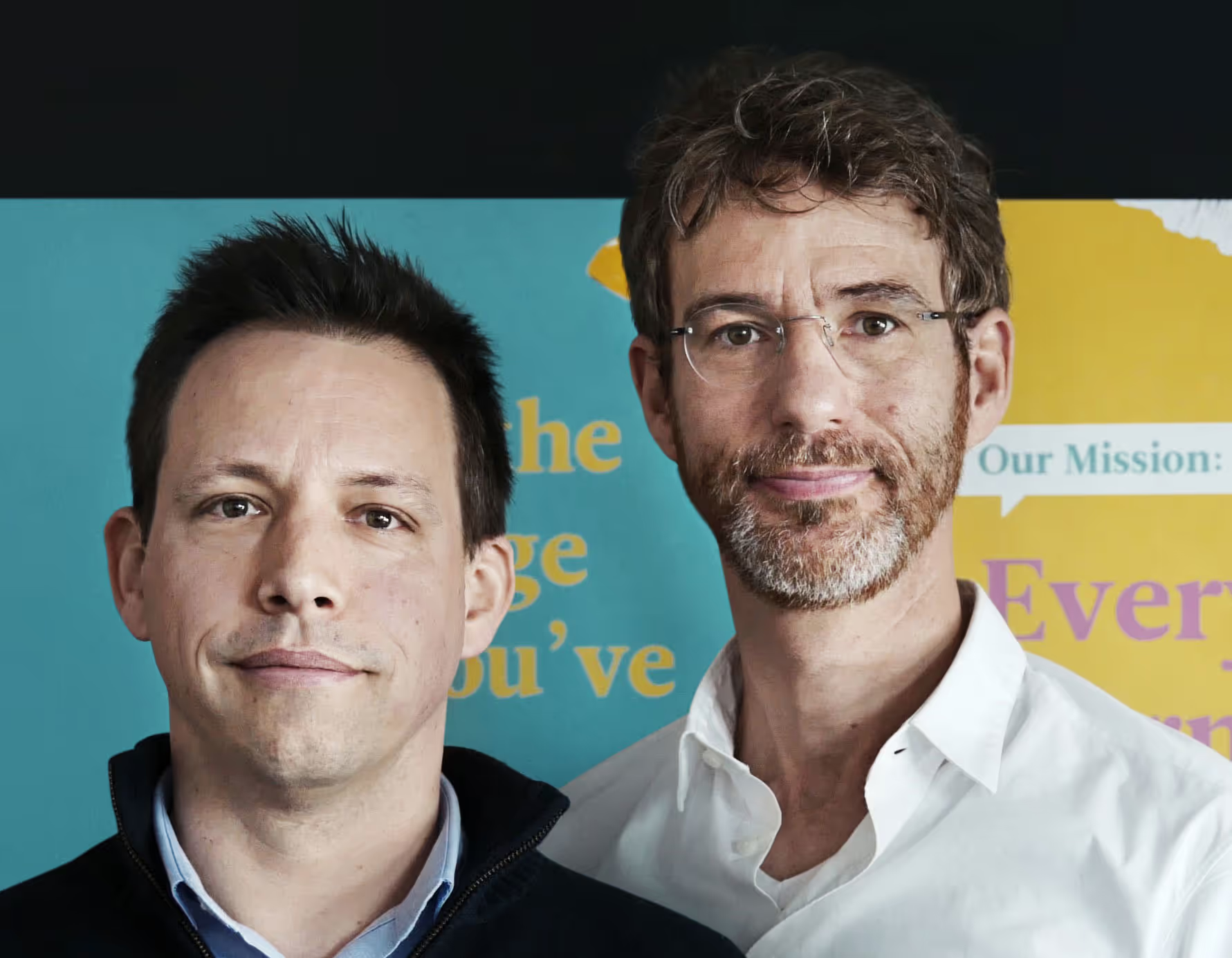Listen now
Berlin-grown Babbel is a learning company from the inside out. Not only because they have a learning product that teaches languages, but because the founders have had to learn things the hard way while building the company – how to build a language product, finding the right business model, building a great team and taking on new markets. It has been a journey full of valuable lessons.
The very core of the company: Diversity and increased understanding
MW: “Building a learning company is something that came naturally to us. We have had to continuously learn in order to stay on top. Even when we first started out, although we were confident as tech guys, we still had to learn from scratch how to build a language app. For us, being a learning company means being open and flexible at all levels – individually, as a group and as a company. We need to continually adjust, and we need to be able to throw things overboard when they are not working anymore.”
Babbel lives and breathes learning and development. The Babbel Academy provides opportunities for continuous learning for Babbel employees, offering courses in everything from neuroscience and decision-making bias to, naturally, language learning. The most important learning happens when people find themselves challenged in new situations and get support from the company to get through those situations.
MW: “A lot is unique about Babbel, and that uniqueness is why people join the company. We don’t have a team that is good at doing what they are told. Instead, we have a team that adjusts and participates. Everyone at Babbel is on a mission. We need to foster that to not create frustration, so we need to be very open and participatory.”

From the start, the mission the founders set out on was to create a high-quality product that increases understanding among different languages and cultures. It was always meant to be a product for the masses. In essence, the founders believed that learning is for everyone. They wanted to build something that people could use every day, and that could potentially change lives. This is still what makes them tick ten years after founding the company. If you walk the five floors of Babbel’s HQ on Max-Beer Strasse, you can hear 45 different languages being spoken – there’s a great feeling of diversity and multiplicity that comes with that.
MW: “Languages have this element of enabling you to understand diversity. If you learn a new language, you get into a new culture – into new ways of thinking – and this enables you to make connections that you never would have made otherwise. That is SO exciting. Making it possible for people to learn a new language who would not have considered it without us is incredibly exciting and has such a big impact.”
TH: “To me, the most rewarding thing about Babbel is the people. It’s amazing to see people grow and step up in their roles, and to see them achieve things we didn’t even know were possible. We have 600 people in total, more than half of whom are women, including management. Diversity in general is high here at Babbel. The diversity is what makes it really interesting. We’ve seen that diverse teams work better and have better outcomes. I think the value is in getting different points of views on everything, which makes collaboration richer and helps us to avoid tunnel vision.”

Taking a different route
In 2009, when most companies were going the “freemium” route, Babbel made a controversial decision and decided to implement a pay-to-play business model. This was a significant game changer for the company, as monetizing early allowed them to really focus on the product and the customer.
MW: “We were hitting a wall, so we had to find a way to monetize. We always ran Babbel in a very bootstrapped way, and for the first year and a half we ran it using our own money. At that time, we were opposed to the thought of running a company on investor money. This might seem a bit different from other startups, but all we cared about was building a sustainable business for our customers and we just could not stomach running the business on ads. In the end, we didn’t have much choice. We felt that the freemium model was one that meant not being fully straightforward with the customers. We wanted to be frank with our users. There was not much experimenting; one day we switched and started providing a pay-to-play product.”
MW: “We were also making a value-based decision. Substance was always very important in what we wanted to build. We never thought about building a company to sell it; we wanted to build something that made sense. The moment we became cash-flow-positive, we didn’t have to spend any time or energy on investor presentations. This allowed us to work on the product and the customers instead.”
TH: “We also found that this model aligned well with our customers, because the single most important thing when you are learning a language is to stick to the learning program and not drop out. With this model, we found alignment with our learners; it turns out that people are more motivated to learn when they’re paying for it directly. This makes learning both easier and faster.”
A German in New York
In 2015, while Babbel was doing well in many markets, they had not yet cracked the US market. They had seen some early interest from the US through Google and the app stores, all just organic. But the founders were quite certain they would need a different formula to enter this market than what they had used previously.
MW: “The question was really how we would enter the US market, not whether or not we should do it. We realized that we had to be present and open an office there to understand how it all works.”
Marcus eventually suggested that Thomas should move to the US and start operations there. Thomas, being a German engineer, was quite skeptical about how it would all work out. He would need to build a sales and marketing organization in the US in a culture that was very different from any in Europe, especially Germany’s.
TH: “In the end, I accepted the challenge, and, as I suspected, it turned out to be a few of the hardest years for me, professionally. On the other hand, learning happens most efficiently when you go into areas outside of your comfort zone, mostly because that is where learning happens fastest.
TH: “During the first two years, the US operation was a genuine startup experience – we had no staff, no brand awareness, no office, nothing really… I was trying to hire people out of a small co-working space, which was very hard. The cultural calibration was probably the hardest part, especially when hiring a local team. With my German background, I frankly never had any idea if people were telling the truth or not, or whether the person I was interviewing was truly capable or not. I just had to accept that it would take some time to get hiring right. One thing that was quite helpful was joining a group of other European entrepreneurs in the US, where we could exchange notes. After two years, we had some of the pieces in place for the operations to start. Once things came together we started seeing small signs of uptick.
TH: “Hiring Julie Hansen as our US CEO was really key to ramping up the business there. It’s a key role and she was perfect for it. The advice I would give other entrepreneurs in this situation is to have a founder build up the US market at first. It’s really difficult to hire and build a team abroad without having someone senior there.
TH: Today, the US is Babbel’s fastest growing market, and in December it was the biggest market in new sales, so it was clearly worth all the trouble.”
10 years from now
MW: “10 years is a long time. When we look ten years back, we were four guys in the back of a model agency. In ten years, when we look back, we will see a company that had only 600 employees and was very small and just at the beginning of everything. The main thing I envision for Babbel is to be a language-learning company that is not just an app, but a way to learn languages wherever you are, however you want to learn, whoever you are. That is what we aspire to be, and we won’t go outside of that field. We are a language-learning company at the end of the day, but we want to change the status quo and be everywhere our learners are.”
Digital language learning is still only 10% of the market compared to the traditional way of language learning, so there is plenty of room for a company like Babbel to grow further. Surprisingly, digital transformation of the teaching and learning industry has not been as rapid as digitization of other traditional industries, but players like Babbel are well equipped to change adoption rates and improve the lives of many through increasing cultural and linguistic understanding.


.svg)






.svg)


.avif)



